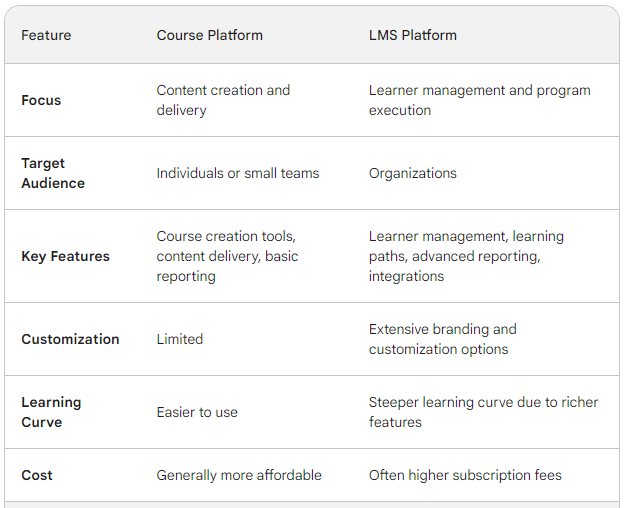The terms 'course platform' and 'Learning Management System (LMS) platform' are often used interchangeably in online education and training. However, they refer to distinct types of software solutions with unique features, purposes, and use cases. Understanding the differences between these two platforms is crucial for educators, organizations, and learners to select the best tool for their needs.
What is a Course Platform?
A course platform is a software solution specifically designed to create, host, and deliver individual online courses.
These platforms are typically geared toward content creators, educators, and subject matter experts who want to develop and sell courses directly to learners.
Key Features of Course Platforms:
Here are some key characteristics of course platforms:
- Course Creation Tools: These include drag-and-drop course builders, multimedia support (videos, audio, images), quizzes, and assignments.
- Marketing and Sales Tools: Integrated features for promoting and selling courses, including landing page builders, payment gateways, and sales analytics.
- User-Friendly Interface: Designed for ease of use, allowing educators to create and launch courses without needing extensive technical skills.
- Student Engagement Tools: Features like discussion boards, comment sections, and community features to foster interaction among learners.
Target Audience:
Course platforms are ideal for:
- Individual educators and instructors
- Small businesses and entrepreneurs
- Content creators aiming to monetize their expertise
Examples of Course Platforms:
- BrainCert: Known for its user-friendly course creation tools and a strong focus on selling courses with many advanced tools and features.
- Udemy: A marketplace model where instructors can create courses and reach a large audience of learners.
What is an LMS Platform?
A Learning Management System (LMS) platform is a comprehensive software solution designed to manage, deliver, and track educational and training programs across an organization or institution.
LMS platforms are used by schools, universities, businesses, and government agencies to facilitate structured learning experiences.
Key Features of LMS Platforms:
Here are some key characteristics of LMS platforms:
- Course Management: Tools for creating, organizing, and managing multiple courses and curricula.
- User Management: Features for enrolling, tracking, and managing learners, instructors, and administrators.
- Assessment and Reporting: Advanced tools for creating assessments, grading, and generating detailed reports on learner progress and performance.
- Collaboration and Communication: Forums, messaging systems, and collaborative tools to support interaction among users.
- Integration Capabilities: Ability to integrate with other systems such as HR software, CRM, and third-party content providers.
- Compliance and Certification: Tools for managing compliance training and issuing certificates upon course completion.
Target Audience:
LMS platforms are best suited for:
- Educational institutions (schools, colleges, universities)
- Large organizations and corporations
- Training departments within companies
- Government and non-profit organizations
Examples of LMS Platforms:
- BrainCert: Offers extensive features for both educators and businesses, focusing on user-centric design and seamless integration.
- Moodle: An open-source LMS known for its flexibility and wide range of features.
- Canvas: Popular in educational institutions for its robust course management and collaboration tools.

Key Differences Between Course Platforms and LMS Platforms
Purpose and Scope:
- Course Platforms: Primarily focused on creating and selling individual courses. Ideal for individual educators and small businesses looking to monetize their knowledge.
- LMS Platforms: Designed to manage comprehensive learning programs across an organization. Suitable for educational institutions and businesses needing a centralized system for training and development.
Feature Set:
- Course Platforms: Emphasize ease of course creation, marketing, and sales tools. Limited in terms of user management and reporting capabilities.
- LMS Platforms: Offer extensive features for user management, detailed reporting, compliance tracking, and integration with other systems.
User Management:
- Course Platforms: Basic user management, usually limited to course enrollments and simple tracking.
- LMS Platforms: Advanced user management, supporting multiple user roles, detailed tracking, and reporting.
Flexibility and Customization:
- Course Platforms: Generally more rigid with fewer customization options, focusing on ease of use.
- LMS Platforms: Highly customizable to meet the specific needs of organizations, including branding, user roles, and course structures.
Here's a table summarizing the key differences:

Choosing the Right Platform
Selecting the right platform depends on your specific needs and goals:
- For Individual Educators and Small Businesses: Course platforms are ideal if you aim to create and sell standalone courses quickly and with minimal technical overhead.
- For Educational Institutions and Large Organizations: LMS platforms are better suited for managing extensive training programs, offering advanced features for tracking, compliance, and integration with existing systems.
- Choose a Course Platform if:
- You're an individual or a small team creating and selling online courses.
- You prioritize ease of use and content creation tools.
- You don't have complex learner management needs.
- Choose an LMS Platform if:
- You're an organization managing a comprehensive learning and development program.
- You need advanced features like learner groups, discussions, and detailed reporting.
- Customization and branding are important for your learning experience.
To Conclude
While both course platforms and LMS platforms deliver education and training online, they cater to different needs and use cases. Course platforms are best for individual course creators focusing on ease of use and course sales. In contrast, LMS platforms provide a comprehensive solution for organizations needing to manage extensive learning programs. Understanding these differences will help you choose the right tool to meet your educational and training objectives effectively.






